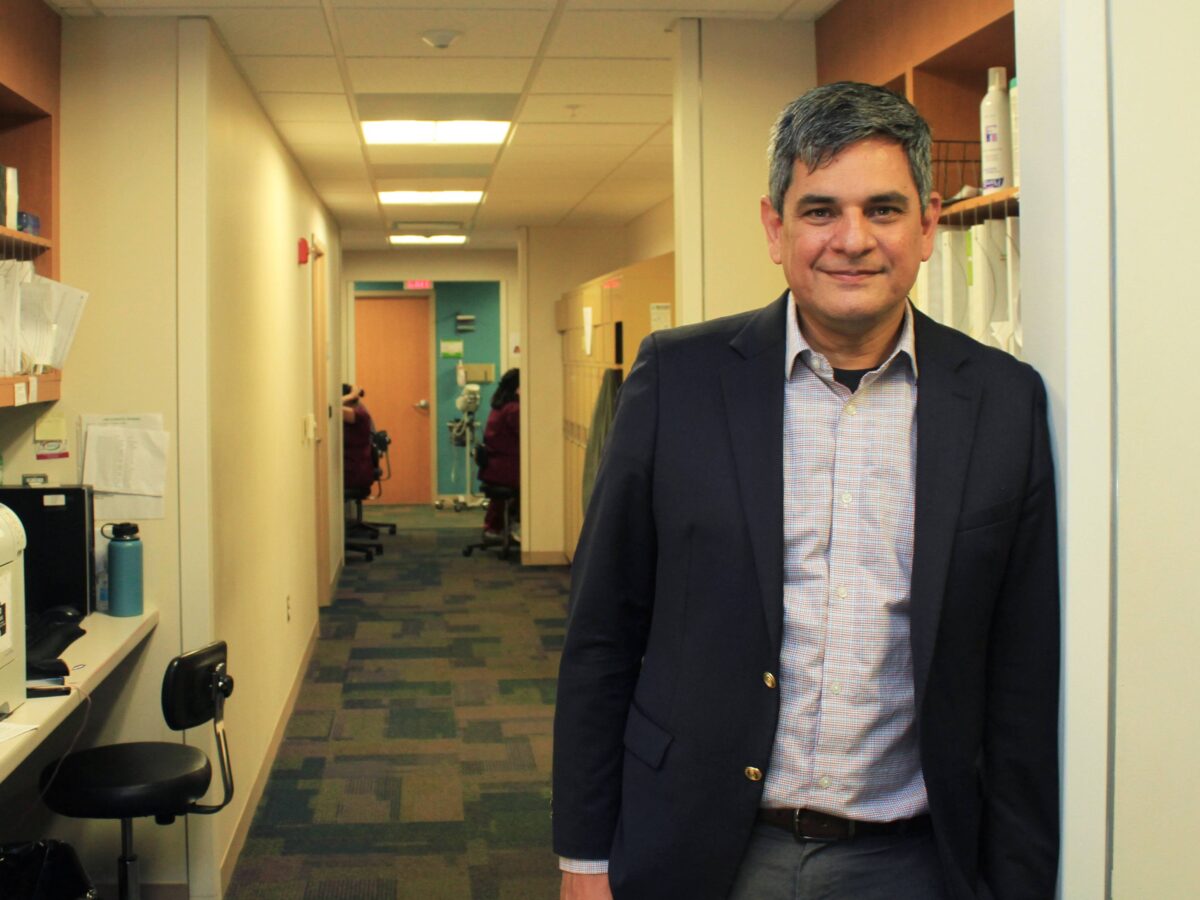Overview:
-Experts warn cutting Medicaid will reverse gains in asthma care made in recent years.
-The budget bill's elimination of clean energy incentives and the Trump administration’s rollback of air quality protections could compound the problem.
-"This is just going to set everything back," says Kathleen Slonager, executive director of the AAFA Michigan chapter.
Detroiter Terra Castro struggles to secure asthma care through Medicaid for herself and her 5-year-old son River, who’s dealt with respiratory infections and pneumonia. It’s been difficult to secure referrals for specialists and find quality care for her son, Castro said.
“I’m constantly fighting just to keep our Medicaid,” Castro said of the administrative burden of staying enrolled. Castro, who’s self-employed, said she’s lucky in some respects because she can make time to call about her coverage.
The burden of staying enrolled in Medicaid could become more challenging because of work requirements and more frequent eligibility redeterminations included in the “One Big Beautiful Bill Act” signed by President Donald Trump last month.
Castro said she will be able to navigate the new requirements and maintain coverage. Her neighbors, who work multiple jobs and are single parents, may not have the flexibility to deal with the hurdles facing Medicaid beneficiaries, she said.
2.6 million Michiganders receive health coverage through Medicaid and over 200,000 are likely to lose coverage, according to a Citizens Research Council report.
This decline in coverage could have an outsize impact on residents with asthma. Nationally, nearly half of children with asthma are covered by Medicaid. Adults enrolled in the program are twice as likely to have asthma than adults with private insurance, according to the Asthma and Allergy Foundation of America.
Experts warn cutting Medicaid will reverse gains in asthma care made in recent years. The budget bill’s elimination of clean energy incentives and the Trump administration’s rollback of air quality protections could compound the problem.
“This is just going to set everything back,” said Kathleen Slonager, executive director of the AAFA Michigan Chapter, adding that asthma mortality declined steeply over the last 20 years.
Asthma deaths in the U.S. decreased from 15 per million in 2001 to 10.6 per million in 2021, according to data from the Centers for Disease Control and Prevention. Nine people still die from asthma each day, according to the AAFA.
Communities of color are disproportionately affected by chronic disease, including asthma, and could face the biggest impacts from Medicaid rollbacks, Slonager said.
Medicaid cuts could add to stress on patients, emergency departments
Experts say that Medicaid rollbacks could send more Detroiters to the emergency room for asthma care, resulting in worse outcomes and higher social costs.
Dr. Tanaz Salimnia, an assistant professor of medicine at Wayne State University and pulmonary specialist at Detroit Medical Center, said a decline in Medicaid coverage could prevent patients from accessing inhalers and other therapies, resulting in office visits, reactive treatments with steroids, and hospitalizations.
Hospitalizations could entail steroid and breathing treatments or intubation, bringing greater risks of serious complications, she said.
“This will come at the expense of the patients having significant out-of-pocket costs, which they cannot afford, or the hospital having to incur those charges,” Salimnia said.
An increase in emergency department visits will increase the strain on an already overburdened health care system, she said.
An April study from the Rand Corporation found U.S. emergency department visits rose consistently between 2020 and 2024, while Medicare and Medicaid inflation-adjusted payments to emergency physicians fell between 2018 and 2022.
In a June letter to Senate leadership, American Medical Association CEO Dr. James Madara said the budget bill “could lead to delays in treatment, increases in emergency room visits and hospitalizations, and other expensive forms of care.”
Patients who are hospitalized for asthma attacks and sent to the intensive care unit could stay in the hospital for around a week, said Dr. Felix Valbuena Jr., CEO of the Community Health and Social Services Center, or CHASS, a community health center in Southwest Detroit.
Extended stays mean adults will miss work and children will be absent from school, resulting in worse economic and educational outcomes for families, Valbuena said.
Environmental rollbacks add to asthma risk
Rollbacks to other environmental programs and air quality rules that help reduce pollution could compound the effects of Medicaid cuts, experts say.
The budget bill cancels incentives for electric vehicles and renewables, cuts environmental programs for underserved communities, and eliminates funding for initiatives to reduce diesel emissions. These changes have the potential to exacerbate the impact of Medicaid cuts, according to the AAFA.
This follows the Trump administration’s announcement in March that it intended to roll back 31 water, air quality, and climate regulations.
These changes could lead to 200,000 premature deaths nationally by 2050 and 10,000 asthma attacks a day, Jeremy Symons, senior advisor at the Environmental Protection Network, previously told Planet Detroit.
The Trump administration announced July 29 it would move to revoke the “endangerment finding,” which determined carbon dioxide and other greenhouse gases endanger public health and welfare, and roll back vehicle greenhouse gas standards.
The moves will result in tens of thousands more premature deaths by 2055 and 25.5 million more asthma attacks between 2027 and 2055, the EPN said in a press release.
MORE PLANET DETROIT REPORTING
As Medicaid cuts loom, are Michigan’s community health workers in jeopardy?
Michigan’s Medicaid reimbursement for certified Community Health Workers marks a pivotal moment in health equity and access, yet looming federal budget cuts threaten to unravel these advances, impacting economic stability for vulnerable communities.
Trump’s Medicaid cuts put estimated 200,000 Michiganders at risk of losing coverage
The passage of Trump’s One Big Beautiful Bill Act poses a threat to the health care of hundreds of thousands of Michiganders with the potential loss of Medicaid coverage and federal funding jeopardizing community health centers like CHASS in Southwest Detroit.
How do transportation struggles affect the health of Detroiters? New project aims to find out
In Detroit, where public transit often falls short, journalist Eleanore Catolico will investigates how lack of reliable transportation impacts health care access for older adults, people with disabilities, and those managing chronic conditions, through a partnership with Planet Detroit’s Neighborhood Reporting Lab and the USC Annenberg Center for Health Journalism.
Financial burden adds to complexity of asthma care
Roughly half of CHASS’s patients are covered by Medicaid and, like other health clinics, the center relies heavily on fixed, per-visit payments from the program, Valbuena said. The budget bill’s reduction of Affordable Care Act marketplace tax credits will also affect many of the clinic’s patients, he said.
When the COVID-19 public health emergency ended, around 37% of Michigan Medicaid beneficiaries lost coverage, according to a report from the Kaiser Family Foundation.
CHASS was able to keep the number of its patients who lost Medicaid coverage at around 1% through its outreach and enrollment efforts, Valbuena said.
The health center will do similar work to ensure Medicaid recipients fill out necessary documents and its largely Spanish-speaking clientele can access translation services if necessary, he said.
“We have … the infrastructure, the staff, the processes, to be able to minimize the number of people that lose Medicaid and, if they lose it, go through the process again to help them get back on,” he said.
The DMC’s Salimnia said reductions in Medicaid coverage could bring a new layer of anxiety for asthma patients. When evaluating a patient, she said she looks at their medical history, medications, chest X-rays, CT scans, vitals, and blood work, but never their insurance status.
“While that levels the playing field and assures all patients are receiving the standard of care, I worry that now, I am going to saddle these patients with medical debt they will never be able to pay off,” she said.





